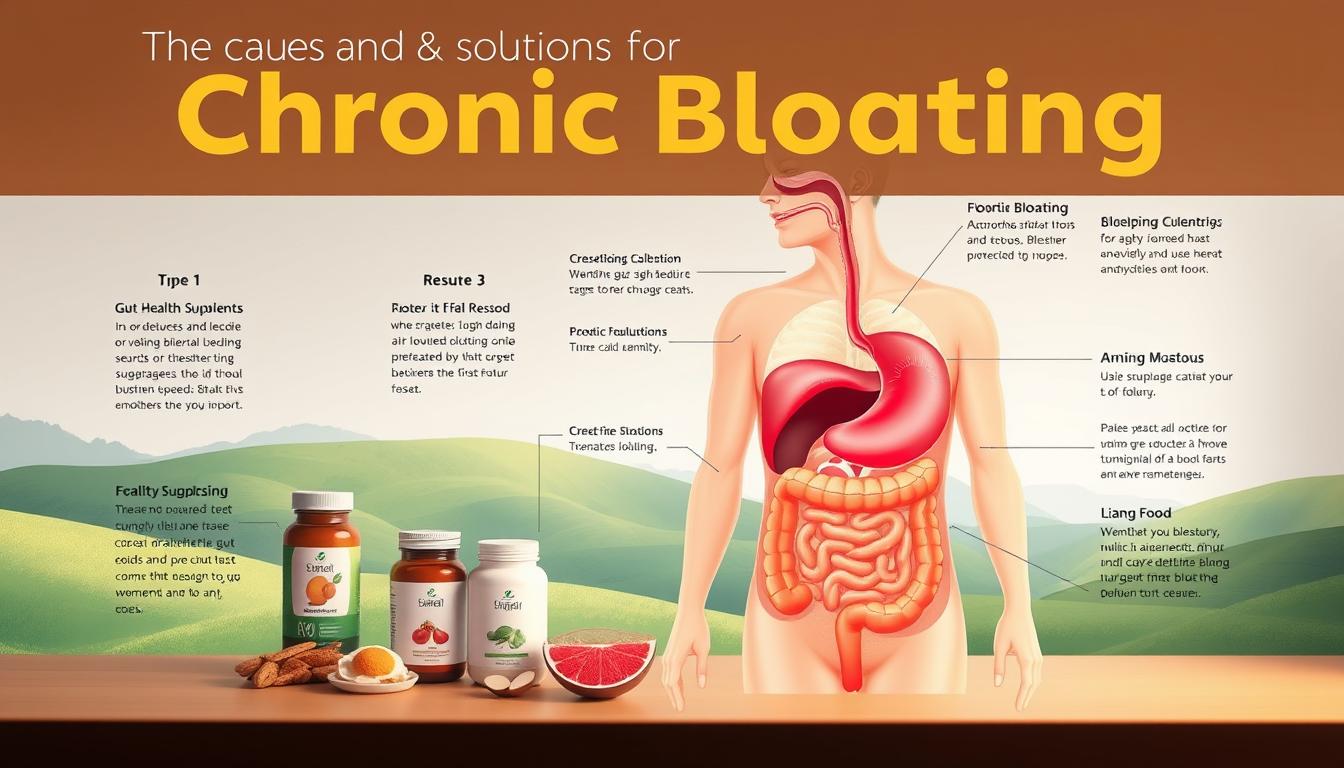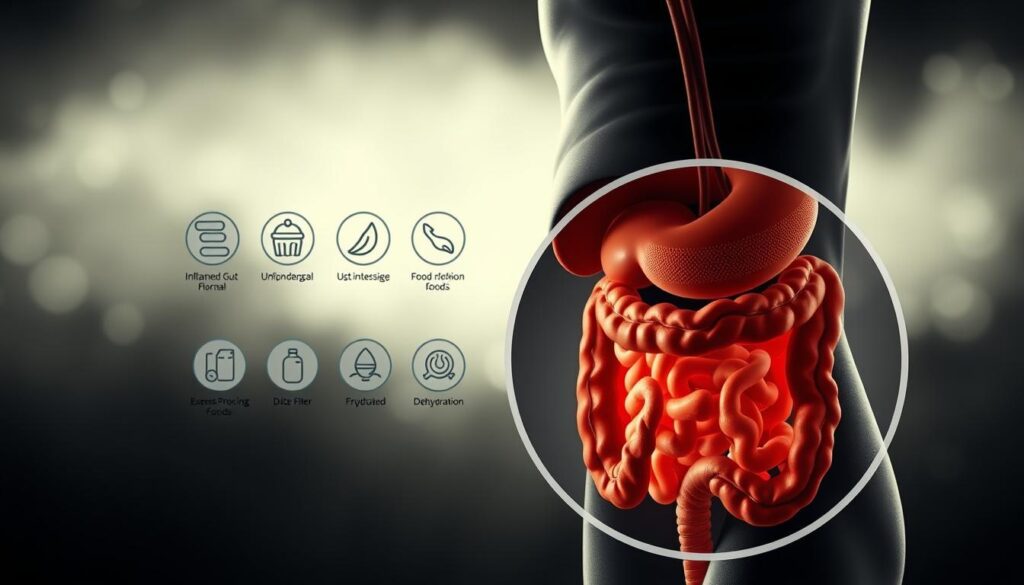Why Do I Have Chronic Bloating? Causes and Solutions

You wake up feeling good, but by midday, your stomach hurts. Your favorite jeans are too tight. You wonder why this happens every day.
Nearly 40% of people deal with chronic bloating. It makes daily life hard. You might feel frustrated and look for answers.
Chronic bloating does more than just hurt. It affects your confidence and social life. You might cancel plans or avoid certain foods without knowing why.
But, finding out why you have bloating can help. It can lead to real solutions.
Doctors at Mayo Clinic in Jacksonville, Florida, studied bloating. They found it’s more than just discomfort. It lowers quality of life and daily activities for millions.
This guide will help you understand bloating. You’ll learn about causes and solutions. You’ll find ways to improve your digestive health.
Key Takeaways
- Chronic bloating affects nearly 40% of the population and significantly impacts daily life
- Multiple factors can cause persistent bloating, including diet, stress, and medical conditions
- Understanding your specific triggers is essential for finding effective relief
- Both lifestyle changes and medical treatments can help manage bloating symptoms
- Seeking professional help is important when symptoms persist or worsen
- Simple dietary adjustments often provide significant improvement for many people
Understanding Chronic Bloating: An Overview
If you’ve been dealing with persistent belly discomfort, you’re not alone. Many people experience chronic bloating that interferes with their daily activities. Understanding what causes this uncomfortable sensation is the first step toward finding effective bloating relief. Let’s explore what chronic bloating actually means and how to recognize its symptoms.
What Is Chronic Bloating?
Chronic bloating occurs when your abdomen feels full, tight, and swollen for extended periods. Unlike occasional bloating after a large meal, this condition persists for weeks or months. Your belly might feel stretched and uncomfortable, often due to excess gas or digestive issues. This differs from abdominal wall laxity, which affects muscle tone.
Research shows that up to 24% of women experience conditions like irritable bowel syndrome (IBS) that can cause persistent bloating. Finding the right bloating remedies requires understanding your specific triggers and symptoms.

Common Symptoms to Look For
Recognizing chronic bloating symptoms helps you determine when to seek professional help for chronic bloating management. Pay attention to these warning signs:
- Visible abdominal swelling or distention
- Feeling uncomfortably full even after small meals
- Excessive gas or belching
- Abdominal pain or cramping
- Changes in bowel movements
| Symptom Type | Frequency | Impact on Daily Life |
|---|---|---|
| Abdominal tightness | Daily | Difficulty wearing fitted clothes |
| Gas and burping | Several times daily | Social discomfort |
| Bowel changes | 3-4 times weekly | Disrupted routine |
The Digestive System and Bloating
Your digestive system is like a complex factory. It breaks down food into nutrients your body can use. When this process gets disrupted, you might feel bloated. Knowing how your digestive system works can help you find ways to treat bloating.
How Digestion Works
Digestion starts when food goes into your mouth. As you chew, enzymes in your saliva start breaking down carbs. Your stomach then uses acid and enzymes to break down proteins.
The small intestine absorbs most nutrients. The large intestine handles water absorption and waste processing. During this journey, your body naturally produces gas. When food moves too slowly or gets backed up, gas builds up and causes bloating.
Role of Gut Bacteria
Your gut has trillions of bacteria that are vital for digestion. These microbes help digest carbs through fermentation, producing gas. In a balanced gut, some bacteria absorb the gases others produce, keeping you comfortable.
But problems happen when bacterial balance shifts. Small intestinal bacterial overgrowth (SIBO) occurs when colon bacteria move to your small intestine. This disrupts digestion and increases gas, making treatment for bloating necessary.
Common Digestive Disorders
Several digestive conditions can cause chronic bloating:
- Irritable Bowel Syndrome (IBS) affects how your gut muscles contract
- Functional dyspepsia causes upper stomach discomfort after eating
- Gastroparesis slows stomach emptying
- Inflammatory bowel disease creates inflammation in your digestive tract
Each condition needs a specific approach to treat bloating based on its cause.
Potential Causes of Chronic Bloating
Understanding why you get chronic bloating starts with finding the root causes. Your digestive system is complex. Many factors can cause long-lasting belly pain. Knowing these causes is the first step to reduce bloating.
Food Intolerances and Allergies
Almost one in five people have a food intolerance. Your body might struggle with certain foods, causing bloating. Foods like dairy and fruits can be trouble.
Celiac disease is an immune reaction to gluten. It affects 1% of Americans. It can make you very bloated if you eat wheat, barley, or rye.

Gastrointestinal Disorders
Many digestive issues can lead to chronic bloating. Small intestinal bacterial overgrowth (SIBO) happens when bacteria grow in your small intestine. Irritable bowel syndrome (IBS) affects millions and often includes bloating.
Other problems like gastroparesis and pancreatic insufficiency can also cause bloating. These issues make digestion hard.
Lifestyle Factors
Your daily habits affect your digestion. Eating fast can make you swallow air, leading to bloating. Not moving enough slows down digestion.
Stress can also mess with your digestion. Even tight clothes around your waist can make you feel bloated. They restrict digestion.
Dietary Habits That Contribute to Bloating
What you eat affects your digestion. Some foods and eating habits can make you feel bloated. Knowing these can help you choose better for your health.
High-FODMAP Foods
FODMAP stands for fermentable carbs. These can cause bloating for many. Your small intestine might have trouble absorbing them, leading to gas in your gut.

- Wheat products, onions, and garlic
- Dairy products containing lactose
- Apples, pears, and stone fruits
- Beans and legumes
- Sugar-free gum with artificial sweeteners
Carbonated Beverages
Sodas, sparkling water, and beer add gas to your stomach. This gas can make you feel bloated. Diet sodas can also make bloating worse because of their sweeteners.
Overeating and Fast Eating
Eating too much or too fast is hard on your stomach. Swallowing air and eating big meals can lead to bloating. Eat smaller meals slowly and chew well for relief.
The Role of Stress in Bloating
Your gut and brain talk to each other in a complex way. This can make everyday stress turn into uncomfortable tummy troubles. When you’re feeling anxious or stressed, your body’s stress response affects your digestion. This often leads to bloating. Knowing this connection is key to managing chronic bloating.

How Stress Affects Digestion
Stress sets off a chain of physical reactions in your digestive system. Your brain sends signals through neural pathways. These signals can:
- Slow down or speed up digestion
- Increase sensitivity to normal gas production
- Cause abdominal muscles to tense or relax abnormally
- Alter gut bacteria balance
Many people with chronic stress feel bloated even with normal gas. This is because they are more sensitive to their gut. This sensitivity often goes hand in hand with conditions like IBS, migraines, and fibromyalgia.
Techniques for Stress Management
Adding stress-reduction practices to your daily routine is a great way to fight bloating. Try these proven methods:
- Deep breathing exercises – Practice belly breathing for 5-10 minutes daily
- Regular physical activity – Gentle yoga or walking helps both stress and digestion
- Mindfulness meditation – Even 10 minutes can calm your nervous system
- Progressive muscle relaxation – Release tension throughout your body
- Adequate sleep – Aim for 7-9 hours to support digestive health
By tackling stress, you can stop the cycle of anxiety and tummy troubles.
Diagnosing Chronic Bloating
Finding the cause of chronic bloating is a detailed process. Your doctor will look at your health history to find the best treatment. They will review your symptoms and medical history. They might also order tests to find the root cause of your bloating.
When to See a Doctor
If bloating lasts more than two weeks or is severe, see a doctor. You should also seek help if you have:
- Unexplained weight loss (more than 10% of body weight)
- Blood in vomit or stool
- Severe abdominal pain
- Persistent vomiting
- Unexplained anemia
- Family history of gastrointestinal cancers
Tests and Procedures
Your doctor might suggest different tests to find the cause of bloating. These tests help create a treatment plan:
| Test Type | What It Detects | How It Works |
|---|---|---|
| Breath Tests | SIBO, lactose intolerance | Measures gases after consuming specific sugars |
| Upper Endoscopy | Stomach and intestinal abnormalities | Camera examines upper digestive tract |
| CT/MRI Scan | Structural problems | Detailed imaging of abdomen |
| Celiac Blood Test | Gluten sensitivity | Checks antibodies in blood |
More tests like wireless motility capsules or anorectal manometry might be needed. Your doctor will choose based on your symptoms and history.
Home Remedies for Chronic Bloating
Looking for ways to ease bloating can really help your daily life. Many find relief with simple home changes. These natural methods target bloating’s causes without needing medicine.
Dietary Changes to Consider
Changing your diet is a key way to fight bloating. The Low FODMAP diet helps many manage symptoms. It limits foods that ferment and cause gas.
Begin by cutting out high FODMAP foods for 2-6 weeks. After symptoms lessen, slowly add foods back. This helps find out which foods upset you. Common offenders include:
- Wheat and rye products
- Dairy items like milk and soft cheeses
- Certain fruits: apples, pears, watermelon
- Vegetables: onions, garlic, cauliflower
- Sweeteners: honey, high fructose corn syrup
Herbal Remedies and Supplements
Natural remedies have eased digestive issues for ages. Herbs and supplements can soothe your stomach and cut gas.
| Remedy | Benefits | How to Use |
|---|---|---|
| Peppermint Oil | Relaxes intestinal muscles | 1-2 capsules before meals |
| Ginger Tea | Speeds up digestion | 1 cup after eating |
| Fennel Seeds | Reduces gas formation | Chew 1 tsp after meals |
| Chamomile | Soothes stomach lining | 2-3 cups daily |
Finding the right remedy takes time. What works for one might not for another. Keep notes on what helps you feel better.
Treatment Options for Chronic Bloating
Finding the right treatment for bloating can really change your life. If diet changes and home remedies don’t work, there are medical options. Your doctor will pick the best one for you based on your symptoms and what’s causing them.
Over-the-Counter Medications
You can buy many medicines at the pharmacy to help with bloating. Simethicone products like Gas-X help break up gas. Activated charcoal tablets can soak up gas before it bothers you.
Digestive enzymes, like Beano, break down carbs that can cause bloating. Antacids with calcium carbonate help with heartburn and bloating. For constipation, laxatives like MiraLAX can help you go regularly.
Prescription Medications
If over-the-counter medicines don’t work, your doctor might give you stronger ones. Antispasmodics like dicyclomine relax your intestines to stop cramps and gas. Prokinetics, like metoclopramide, help your stomach empty faster if it’s slow.
For IBS-related bloating, neuromodulators like amitriptyline can help. Rifaximin is a special antibiotic for small intestine bacteria without harming good bacteria.
Probiotics and Their Benefits
Probiotics are a natural way to treat bloating by balancing gut bacteria. Lactobacillus and Bifidobacterium improve digestion and cut down gas. You can find them in yogurt, kefir, and supplements.
Studies show probiotics can lessen bloating in 4-8 weeks. Look for products with many strains and at least 10 billion CFU for the best results.
Lifestyle Changes to Reduce Bloating
Making small changes in your daily life can help a lot with bloating. Your body likes to move and eat in certain ways. These changes can make you feel better and less bloated.
Exercise and Its Impact
Exercise makes your digestive system work better. Walking for 20 minutes after meals helps digestion. It stops gas from building up.
Yoga, like child’s pose and twists, gently works your insides. Swimming and cycling are great for your core without hurting your belly.
Being too sedentary slows down your intestines. This lets gas build up. But, even a little stretching helps keep things moving and reduces bloating.
Mindful Eating Practices
How you eat is just as important as what you eat. Chewing food well makes digestion easier. Try to eat slowly and put your fork down between bites.
| Eating Habit | Impact on Bloating |
|---|---|
| Eating while distracted | Increases air swallowing and overeating |
| Small, frequent meals | Reduces digestive strain |
| Sitting upright while eating | Improves digestion flow |
| Avoiding straws | Decreases air intake |
Eating in a calm place helps your body digest better. Turn off screens, eat at a table, and listen to your body. These habits can help you feel less bloated naturally.
When to Seek Professional Help
Most bloating symptoms go away with simple diet changes. But, some cases need medical help. Knowing when to see a doctor is key for your health.
Signs That Indicate a Serious Condition
See a doctor if bloating doesn’t get better in two weeks or gets worse. Fever with bloating might mean an infection like H. pylori. Vomiting and severe bloating need quick medical check-up.
These could be signs of serious issues like ascites from liver disease or heart failure. Pancreatic insufficiency, where the pancreas can’t make enough digestive enzymes, is another concern. Gastritis and enteritis, caused by infections or too much alcohol, also need attention.
Chronic bloating can be a sign of cancer in the ovaries, colon, pancreas, or stomach. Regular check-ups can catch these early through screenings.
Finding the Right Specialist
Your primary care doctor can help find the right specialist. Gastroenterologists deal with digestive issues and can do tests like colonoscopies. Women should not skip their yearly pelvic exams for similar reasons.
Oncologists might be needed for cancer screening results. Having a team of healthcare professionals ensures you get the best care for your bloating and digestive health.
